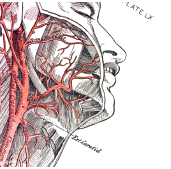This study was conducted to investigate the association of high sensitivity c-reactive protein (hsCRP) on early carotid atherosclerosis progression in a large, population-based cohort study. The study cohort included 839 young adults (aged 24 to 43 years, 70% white, 42% men) enrolled in the Bogalusa Heart Study, who underwent baseline examinations in 2001-2002 for measurements of cardiovascular disease risk factors. Progression of carotid artery intima-media thickness (IMT) was assessed during a mean follow-up of 2.4 years. Carotid artery IMT progression rates were as follows: composite carotid artery = 9.2 +/- 52 um/y, common carotid artery = 0.0 +/- 51 um/y, carotid bulb = 8.8 +/- 103 um/y, and internal carotid artery = 18.9 +/- 81 um/y. Elevated baseline hsCRP revealed an independent association with composite carotid artery IMT progression. Increased age, systolic blood pressure, fasting glucose, LDL cholesterol, and current smoking were also found to increase risk of carotid artery IMT progression in young adults. The authors concluded that this study underlines the importance of assesssing hsCRP levels along with smoking and traditional cardiovascular disease risk factor profiles in asymptomatic young adults. BMC Cardiovasc Disord. 2011 Dec 30;11(1):78. PMID: 22208681
Home Research News C-reactive protein is an independent predictor for carotid artery thickness progression









